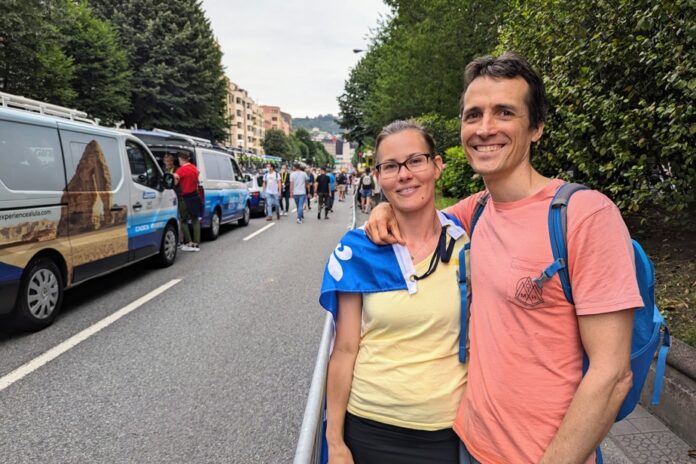(Bilbao) It was just luck, but my hotel in Bilbao was literally a block away from the start line of the first stage of the Tour de France.
It is built squarely above the San Mamés intermodal station, which allowed me to jump on a coach in a jiffy to reach Vitoria-Gasteiz, where Israel-Premier Tech is located an hour to the south. Less practical when you learn it after a transatlantic trip.
Lacking a functional phone from the outset, I managed with the means at hand, that is to say the lady behind me at the terminal. My Euskera being limited – and my Spanish not much better –, we managed with a little French, English and, above all, the signs.
The metro, opened in 1995, is obviously connected to the station and works wonderfully for a trifle. Even by paying the entry of two colleagues on Saturday, I will not be able to completely empty the 10 euros from my Barik card, which must mean “Opus” in Basque.
However, I walked around the city, visiting the AG2R Citroën hotel near the port and the vast congress center where A.S.O. has set up the press center for the big start and the Tour office.
The start of the first stage was given in the shade of campo San Mamés, home of Athletic Bilbao inaugurated in 2013. A young colleague from Oxford who works for Cycling Weekly, crossed in the press room, was all amazed to have walked the pitch of the 50,000-seat enclosure.
Despite the popularity of the La Liga soccer club, made up entirely of Basque players, cycling remains the Basques’ favorite sport.
“Football is big, but we’re crazy about bikes here,” assured me Iker Yuguero, a French-speaking Spanish Basque I met near the Israel-Premier Tech bus. He was with his lover, Élise St-Denis, a Quebecer who wore a fleur-de-lis flag on her shoulders.
“Even she started doing it. That’s because it’s contagious! »
The passenger sitting across from me on the metro on the way back from the first leg was wearing an “Ibiza” cap and a t-shirt with large camouflage letters saying “WOKE”. There was no riot.
Banned under the Franco regime, the ikurrina, (pronounced “icourrigna”), the red, green and white Basque flag, was legalized in January 1977. It symbolizes “enthusiasm and joy”, according to Le Pays basque for null. Just about everyone around the race owns one. These bike supporters even have a name: Zaleak. For five euros, given to Gure Esku, a platform created in 2013 in favor of the self-determination of the Basque Country, I became one.
One last anecdote before going to bed: a Quebecer picked up my accent in the arrivals press room. This is Vincent Gourd, from the television production company Zone3. A cycling enthusiast and himself a cyclist, the associate producer took advantage of the family holidays in Biarritz to attend the three stages of the big departure.
“I came to scout,” he explained, impressed by the extent of the logistics deployment of the organizer A.S.O. The speed with which the starting village is packed after the kick-off knocked him down.
“Interest in cycling is skyrocketing with the successes of Quebecers and now the Netflix series. »
Gourd has no specific plans at the moment, but he is beginning to test the waters.
He is a great friend of colleague Mathias Brunet, with whom he made a few documentaries, including those on referees and parents in hockey. Their two 16-year-old sons, Edouard and Antoine, who are also best friends, accompany him with a few other families to Biarritz.
Surfing is their favorite activity and it seems that Antoine Brunet got it right the first time. Here is one who inherited his father’s natural talent.















